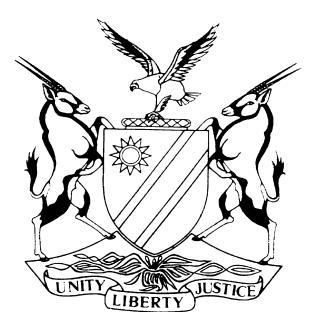NOT REPORTABLE

HIGH COURT OF NAMIBIA NORTHERN LOCAL DIVISION, OSHAKATI
REVIEW JUDGMENT
Case no.: CR 16/2017
In the matter between:
THE STATE
and
MATHEUS NANGOLO ACCUSED
HIGH COURT NLD REVIEW CASE REF NO: 170/2016
Neutral citation: S v Nangolo (CR16 /2017) [2017] NAHCNLD 90 (5 September 2017)
Coram: TOMMASI J and JANUARY J
Delivered: 5 September 2017
Flynote: Criminal Procedure ― Section 77(6) of the Criminal Procedure Act does not make provision for the order given by the court a quo ― S v Narib; S v Nyambali 2010 (1) NR 273 (HC) already dealt with a similar order ― Held that the South African amendment to s 77(6) of Criminal Procedure Act 51 of 1977 not applicable in Namibia ― Order in terms of s 77(6) is neither a conviction nor an acquittal and is therefore not subject to review in terms of s 304 of Act 51 of 1977.

ORDER
___________________________________________________________________
1. No confirmation is made by this court in respect of the orders by the magistrate.
2. The records of the proceedings are returned to the magistrate.
3. The accused persons must be dealt with in terms of the provisions of s 77(6) of Act 51of 1977 read with the provisions of the Mental Health Act 18 of 1973.

REVIEW JUDGMENT

TOMMASI J (JANUARY J concurring):
[1] This matter was sent to this court for review. The accused was charged with two counts of having contravened s 2(1)(a) of the Combating of Rape Act, 2000 (Act 8 of 2000).
[2] The accused was arrested on 28 July 2014 and the record of proceedings reflects that he appeared in the district court on 8 August 2014 before an assistant magistrate. It is evident that the accused appeared in court before this date as he had been referred to the Social Welfare Officer for screening. In terms of this report the accused was 18 years old and it was recommended that the accused ought to be referred for mental observation as he appears to be “mentally unstable”. The assistant magistrate interviewed the aunt who testified that the accused has been suffering from mental illness since his childhood. On the strength of this the assistant magistrate released the accused in the care of his guardian and “remanded the case for mental observation.”
[3] It should be noted that section 11 (7)(A) (b) of the Magistrates Act 3 of 2003 stipulates as follows: ‘Despite section 16(1)(a) and despite section 8 of the Magistrates' Courts Act, an assistant magistrate appointed under paragraph (a) may, in the absence of a magistrate, hold a court of a district or sub district, but only for the purposes of-
(i) postponing cases;
(ii) granting of unopposed bail;
(iii) withdrawing cases upon the request of the prosecution but before pleading;
(iv) authorising of warrant of arrest, execution to be held over 14 days and authorising accused persons to be held in custody;
(v) handling estates of deceased persons in terms of the Policy and Procedure Manual for Magistrates;
(vi) signing formal documents in respect of duties assigned to magistrates in respect of deaths;
(vii) solemnising marriages; and
(viii) approving applications for temporary liquor licences.’
The assistant magistrate was not authorized to hear evidence nor was he/she authorized to refer the accused for mental observation. Thankfully the accused was not referred for observation on the strength of that order but as per an order by a Magistrate on 23 March 2015.
[4] The psychiatric report revealed that the accused could not follow court proceedings; and that he is not accountable for the alleged crime committed as he does not appreciate the wrongfulness of his action during the commission of the alleged crime.
[5] The court a quo gave the following order:
‘Orders accused to be detained in such hospital or custody pending signification by a review judge or state President;
The order releasing the accused under care of guardian is hereby cancelled
Guardian is excused;
Accused is committed to prison.
The matter is to be sent for review.’
[6] Section 77(6) of the Criminal Procedure does not make provision for the order in 1 above. In S v Narib; S v Nyambali 2010 (1) NR 273 (HC) the court already dealt with a similar order and held that the South African amendment to s 77(6) of Criminal Procedure Act 51 of 1977 not applicable in Namibia and that the order in terms of s 77(6) is neither a conviction nor an acquittal and is therefore not subject to review in terms of s 304 of Act 51 of 1977.
[7] In the result the following order is made:
1. No confirmation is made by this court in respect of the orders by the magistrate.
2. The record of the proceedings are returned to the magistrate.
3. The accused persons must be dealt with in terms of the provisions of s 77(6) of Act 51of 1977 read with the provisions of the Mental Health Act 18 of 1973.
________________________
M A TOMMASI
JUDGE
I agree
________________________
H C JANUARY
JUDGE